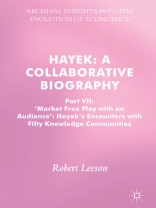This book is the seventh volume in this series
which explores the life of Nobel Price-winning economist F.A. Hayek (1899-1992). The volume uses archival material, juxtaposed with Hayek’s published work to challenge the existing perceptions of his life and thought. It examines the methods by which Hayek interacted with – and schemed against – the knowledge communities that he encountered during his very long life. Chapters explore the ‘rules of engagement’ that Hayek employed when interacting with fifth leading knowledge communities, including the Nobel Prize selection committee who were led to believe his claim about having predicted the Great Depression. It also explores his interactions with William Beveridge, the founder of the modern British Welfare State, A. C. Pigou, the founder of the market school, J. M. Keynes, Sir Arthur Lewis, and Abba Lerner.
表中的内容
1. Introduction.- 2. 2. Hayek’s ‘more effective form’.- 3. Post-Habsburg
Führercults: Hayek, Hitler, Mises, Mayer and Spann.- 4. Hayek’s ‘framework of traditional and moral rules’.- 5. Universities and pseudo-academic Institutes: corruption, deflation, and opportunity.- 6. Honor.- 7. Austrian Business Cycle Theory and Hayek Triangles.- 8. 1-3: Austria, 1899-1931.- 9. America, Freudians, and the quest for producer sovereignty
.- 10. Austrians and the Holocaust.- 11. London, Cambridge and Gibraltar, 1931-1949.
12. Chicago, 1950-1962.- 13. Europe, 1962-1992.- 14. The Nobel Prize Community, 1901.
关于作者
Robert Leeson has been a prolific contributor to the Schools of Economic Thought literature for a quarter of a century. He is ranked joint 17th with Paul Samuelson, based on the number of published journal articles included in the ECONLIT database of the American Economic Association. His articles have appeared in the
Economic Journal, Economica, Cambridge Journal of Economics, Journal of Post Keynesian Economics, History of Political Economy and elsewhere. He is also a prolific op-ed columnist and economic commentator for a variety of newspapers, including the
San Francisco Chronicle and the
Australian Financial Review. In a 2005 column in the
San Francisco Chronicle he predicted the global financial crisis.












